Papers by Matthew J . Spaniol
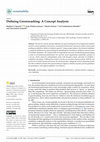
Sustainability, 2024
The lack of a shared, operant definition for greenwashing has led to fragmented scholarly researc... more The lack of a shared, operant definition for greenwashing has led to fragmented scholarly research, unclear guidelines for practice, inconsistent enforcement, and reactive policy frameworks; resulting in ineffective efforts to combat its growth. Using concept analysis, this research establishes a composite definition for greenwashing by identifying the constitutive attributes sourced across 79 scholarly definitions. The analysis finds six requirements necessary for identifying greenwashing: a claim on environmental performance by a private sector organization marketing a product or a service, which cannot be substantiated, made with deceptive intent, and done to establish a
competitive advantage. Fulfilling these criteria warrants an accusation of greenwashing. With the aim to prevent its further spread and misuse, the article provides a diagnostic tool for separating similar but often conflated concepts from greenwashing to organize scholarly research, provide guidelines for practitioners, and support regulators’ case analysis.
Baltic Rim Economies, 2024
The SECMAR consortium, tasked with advancing secure digitalization
for sustainable blue economies... more The SECMAR consortium, tasked with advancing secure digitalization
for sustainable blue economies, issued a foresight report on cybersecurity
for executives and policymakers. This column summarizes
the emerging attacker enablers, defender trends, and recommendations
for companies, policymakers, and industry. The column can be used by
executives and policymakers as a starting point for a discussion with
cybersecurity professionals to determine the status of protections.
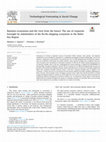
Technological Forecasting and Social Change, 2022
Ecosystems are viewed as important sources of innovation. While contracts, rules, policies, and i... more Ecosystems are viewed as important sources of innovation. While contracts, rules, policies, and industrial standards have been identified as important for coordinating and aligning inter-firm relationships, tools for the collective, collaborative orchestration of ecosystems have yet to be fully identified and articulated by scholars. The core contribution of this paper, the authors contend, is that corporate foresight tools, as applied at the level of the ecosystem, have the potential to orchestrate ecosystems. To this end, the authors examine the practical use of corporate foresight tools, in this case, roadmapping and scenario planning, as employed by ECOPRODIGI, an Interreg Baltic Sea project designed to advance the EU's strategy for eco-efficient Sustainable Blue Economy in the Roll-on/Roll-off (Ro-Ro) shipping ecosystem. Results demonstrate how ecosystem-level foresight significantly differs from traditional foresight centered around a focal firm. Corporate foresight tools, as applied to an ecosystem: 1) Target a diverse set of ecosystem actors beyond the segment's focal firm, including complementary firms, investors, and non-market actors; 2) Engage ecosystem actors, rather than only the focal firm, in shared strategy development based on a diverse mix of foresight tools; and 3) serve to orient and reify the ecosystem by charting the collective anticipation of innovations, policies, etc., in a shared set of future options. In the end, the authors find that corporate foresight tools operate as constitutive elements of ecosystems, that is, the tools help enact the ecosystem not as an abstract concept but as a shared, lived reality.
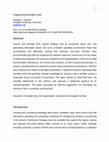
World Futures Review, 2024
Futures and foresight tools support strategy work by structuring inquiry into-and generating info... more Futures and foresight tools support strategy work by structuring inquiry into-and generating information about-the user's uncertain operating environment. Each tool accomplishes this differently, making their selection non-trivial. Scholars have recommended that tools be organized for selection based on criteria such as the nature of inquiry they generate, the resources needed for their implementation, their input or data transformation affordances, the content they produce, or their temporal directionality. In practice, foresight tools are selected by actors under constrained circumstances. With the aim to improve the impact of foresight investments, a selection schema is developed that shortlists tools that generate relevant knowledge for solving a users' problem across a landscape (locus and level) of uncertainty. The paper reports on initial field tests, the resulting refinements to the schema, and proposes a diagnostic protocol for its operationalization. The paper concludes by offering suggestions for leveraging the schema in firms, consulting, and teaching.
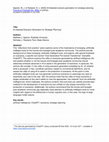
Futures & Foresight Science, 2023
This “reflections from practice” piece explores some of the implications of emerging, artificiall... more This “reflections from practice” piece explores some of the implications of emerging, artificially intelligent tools for the futures and foresight prac-academic community. The authors provide background on these emerging, artificially intelligent tools, and explore, with special emphasis
on scenarios, a specific tool named “Chat Generative Pre-trained Transformer” (hereafter, ChatGPT). The authors examine the utility of scenarios generated by artificial intelligence (AI) and explore whether or not the futures and foresight prac-academic community should selectively embrace advances in AI to assist in the generation of scenarios. In particular, the authors will consider (1) the utility of using scenarios generated completely by AI, (2) whether what is produced, in fact, constitute scenarios, based on conventional definitions, and (3) assess the utility of using AI to assist in the production of scenarios. At this point in time, artificially intelligent tools can now generate numerous scenarios on seemingly any topic at essentially zero cost to the user. Still, the authors insist that the utility of those scenarios is largely predicated on the user’s ability to coax the appropriate “raw material” from the artificially intelligent bot, which implicates, the authors contend, that such bots can usefully provide base material for the development of scenarios but are unlikely to fully eclipse scenarists in the production of scenarios. Additionally, the authors recommend that the futures and foresight prac-academic community pay especially close attention to artificially intelligent tools for novel insights with regard to the differences in human cognition and, in this case, the logic of large language model outputs.
Journal of Business Models, 2019
We discuss our lessons from 8 years of teaching business model innovation to executives in our pa... more We discuss our lessons from 8 years of teaching business model innovation to executives in our part-time MBA program. We examine how strategic foresight tools are particularly useful to help students to overcome the cognitive bounds that inhibit business model innovation and discuss the considerations of using student-owned live cases.
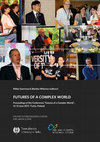
FUTURES OF A COMPLEX WORLD, 2018
Managers utilizing scenario planning for strategy development may be surprised to learn that scho... more Managers utilizing scenario planning for strategy development may be surprised to learn that scholars in futures studies, an area responsible for research on foresight techniques, generally do not know why scenarios work. For more than a decade, scholars have prefaced their scientific communications by conspicuously bemoaning the lack of theory to support scenario methodology. This presents managers, scholars, and scenario planning facilitators with a paradox. Concern over insufficient theory and methodological chaos within the scenario planning literature is well known, but not so well known that the claim no longer requires frequent rendition (which the authors demonstrate); moreover, this gap in the literature has yet to be bridged despite repeated calls dating back to the 1970s. They conclude that although this concern is not unreasonable, it also serves a number of secondary, collateral functions. Ultimately, rehearsing the claim that there is insufficient theory to support scenario methodology acts as a readymade justification for adopting theory from outside of future studies and for developing one methodological typology after another; counter intuitively, both moves appear to deprive scenario planning of precisely the foundational theory and shared methodological toolkit scholars claim it desperately needs.
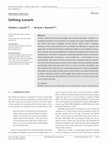
Related video by authors about this paper from Wiley: https://onlinelibrary-wiley-com.ezaccess.li... more Related video by authors about this paper from Wiley: https://onlinelibrary-wiley-com.ezaccess.libraries.psu.edu/journal/25735152
Scholars claim that futures and foresight science should overcome “confusion” regarding the definition of core concepts, for example, the scenario. Admittedly, defining
scenario has been a challenge. Current practice, which results in repeated attempts to clarify said confusion with yet another new definition of scenario, has apparently not advanced the field. An alternative option is not to redefine scenario, but to, instead, create a shared definition composed of component parts of pre‐existing definitions. The result is an operant or synthesized definition based on analysis of claims indicating what “a scenario is…” and “scenarios are…” in the literature on scenario planning. The authors find that scenarios have a temporal property rooted in the future and reference external forces in that context; scenarios should be possible and plausible while taking the proper form of a story or narrative description; and that scenarios exist in sets that are systematically prepared to coexist as meaningful alternatives to one another. Despite claims to the contrary, the authors find that the academic community of futures and foresight science does not seem to suffer from so‐called confusion over the definition of scenario, and thus, it is time to sunset the use of claims to this end.
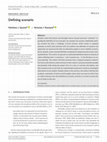
Futures & Foresight Science, 2018
Scholars claim that futures and foresight science should overcome “confusion” regarding the defin... more Scholars claim that futures and foresight science should overcome “confusion” regarding the definition of core concepts, for example, the scenario. Admittedly, defining scenario has been a challenge. Current practice, which results in repeated attempts to clarify said confusion with yet another new definition of scenario, has apparently not advanced the field. An alternative option is not to redefine scenario, but to, instead, create a shared definition composed of component parts of pre‐existing definitions. The result is an operant or synthesized definition based on analysis of claims indicating what “a scenario is…” and “scenarios are…” in the literature on scenario planning. The authors find that scenarios have a temporal property rooted in the future and reference external forces in that context; scenarios should be possible and plausible while taking the proper form of a story or narrative description; and that scenarios exist in sets that are systematically prepared to coexist as meaningful alternatives to one another. Despite claims to the contrary, the authors find that the academic community of futures and foresight science does not seem to suffer from so‐called confusion over the definition of scenario, and thus, it is time to sunset the use of claims to this end.
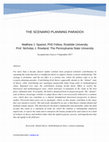
For more than a decade, futures studies scholars have prefaced scholarly contributions by repeati... more For more than a decade, futures studies scholars have prefaced scholarly contributions by repeating the claim that there is insufficient theory to support chaotic scenario methodology. The strategy is formulaic, and the net effect is a curious one, which the authors refer to as the scenario planning paradox. Contributing fresh theory supposedly attends to the " dismal " state of theory, while contributing new typologies purportedly helps bring order to methodological chaos. Repeated over time, the contribution strategy breaks down. Effort to resolve the theoretical and methodological issue, which motivates re-statement of the claim in the first place, ultimately fails. In actuality, the field is distanced from its purported goals. The " dismal " state of theory encourages scholars to adopt theory that is not necessarily tethered to a common core, which does not contribute to a shared, foundational theoretical perspective in futures studies. Perceived chaos gives way to typologies, which, as they mount, contribute to the chaos they were meant to resolve. The end result, intended by no one, is that theory remains dismal and methods remain chaotic. This direction for the field is indefensible and untenable; either the field accepts this claim as a statement of truth, for which the solution is substantially enhanced empiricism, or rejects the claim and re-interprets the bounty produced by said claim to be a kind of richness in theory and method rather than the implicit paucity, poverty, and imperfection that they oft signify to the field now
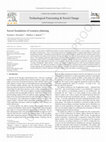
In this article, the authors establish that models of scenario planning typically involve a serie... more In this article, the authors establish that models of scenario planning typically involve a series of phases, stages, or steps that imply a sequenced (i.e., linear or chronological) process. Recursive models, in contrast, allow phases to repeat, thus, incorporating iteration. The authors acknowledge the concerns voiced in futures studies that while models based on practical experience are common in the literature, forming a theoretical basis for why those practices work is often considered elusive. This includes models that imply linearity and those that accommodate iterativity. With theory from science and technology studies (STS) on knowledge production, the authors explain transition from one phase to the next and iteration between and within phases based on social negotiation. To this end, the authors examine the interplay between the " scenario development " phase and the " scenario use " phase of a planning process with a non-governmental organization in Denmark. The upshot for facilitators is practical insight into how transition between phases and phase iteration in scenario planning can be identified, leveraged, and, thus, managed. The upshot for scholars is a related insight into why scenario planning is a kind of laboratory for futures studies wherein the future is experimented upon.
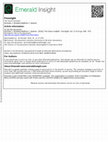
Purpose – This paper asks “Why is the future in futures studies plural?” The attitude toward inqu... more Purpose – This paper asks “Why is the future in futures studies plural?” The attitude toward inquiry,
based on post-actor-network theory (ANT) literature, positions philosophical questions about the
ontological character of the future within the context of “planning” for it (i.e. in practice). Multiplicity, as
a post-ANT sensibility, helps one make sense of the empirical materials. This paper examines the
possibility that rather than being alternatives to one another, plural futures and the singular future might
co-exist in practice, and, thus, constitute a multiplicity.
Design/methodology/approach – In this case study, “planning” is narrative scenario planning. The
second author facilitates dialogue-based long-term strategic scenario planning processes, primarily in
Scandinavia and Northern Europe, and contributes a wealth of professional experience to the project.
The first author, an academic, shadows the second author. This paper examines experiential and
observational data for evidence of the ontological character of the future. Elements of a typical scenario
planning process, in this case, about the possibility of crewless (i.e. unmanned) shipping vessels are
demonstrated – although, insight into the crewless ship is submerged by our analytical attentiveness to
the ontology of the future.
Findings – The findings bear on what sort of “object” the future is. Practices associated with planning
for the future appear to transform it so that one future becomes many, and, without irony, managing the
growing number of futures seems to be a core function of planning for the future. The implication is that
neither plural futures nor the singular future is – individually – satisfactory to capture what is found in
practice. It is both plural and singular; ontologically, it is the future multiple.
Originality/value – The original contribution is in demonstrating how plural futures and the singular
future co-exist in practice. Thus, an eclipse of the future by futures can only ever be partial. For “futures”
to be conceptually potent, “the future” must be at least provisionally believable and occasionally useful.
Otherwise, if “the future” were so preposterous an idea, then “futures” would cease to be a critical
alternative to it. Futures needs the future; they are relationally bound together in a multiplicity. This paper
considers what such a logical reality implies for a field that distances itself from the future and
self-identifies with futures.
Keywords Ontology, Scenario planning, Actor-network theory, Maritime industry, Multiplicity,
Science and technology studies
Thesis Chapters by Matthew J . Spaniol

This dissertation attempts to deepen the intellectual traffic between Scenario Planning and Scien... more This dissertation attempts to deepen the intellectual traffic between Scenario Planning and Science and Technology Studies. It does this by taking on the lenses of empirical research of practice at the sites of the
production of futures in facilitated scenario planning workshops and the certified knowledge produced about futures and scenarios in academic accounts and claims. Taking seriously the observation that scenario planning is the “laboratory” where futures are discovered and
experimented upon, this dissertation leverages the insights developed in the so-called “Laboratory Studies” in STS to unravel the inner workings of the practices of scenario planning (Latour & Wollgar, 1979). The findings support the notions that the relations between science,
laboratories, and scenarios are not trivial: The scientists and scenarists, with their instruments, methods, colleagues, and laboratories, carefully inscribe, negotiate, edit, and enact futures.
Talks by Matthew J . Spaniol
Research Articles by Matthew J . Spaniol
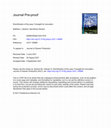
Journal of Cleaner Production, 2021
Productive activity in the North Sea Region (NSR) is expected to intensify, diversify, and expand... more Productive activity in the North Sea Region (NSR) is expected to intensify, diversify, and expand further offshore. Pressure to decarbonize and “electrify” the existing and emerging industries of the ocean
economies offer an opportunity as the electrification of the seas has captured the imagination of industry and policymakers as a pathway to achieving sustainable growth. Using the methods of morphological
analysis, thematic analysis, and structural analysis, this article identifies and reports on six innovation concepts for the electrification of the seas: Charging at wind farms; Charging at fish farms; Charging at thermal-powered platforms; Charging by floating solar panels; Charging at tidal plants; Charging at offshore container terminals. This article provides a base for entrepreneurship by generating insight into the affecting variables for each configuration as well as the identification of the strategic variables. It furthermore contributes a novel methodological approach to produce said understanding. The paper concludes with prospects for the electrification of the seas and charts a pathway for sustainable transition of the ocean economies.
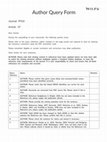
Two patterns of inquiry in futures and foresight science have been called into ques- tion, namely... more Two patterns of inquiry in futures and foresight science have been called into ques- tion, namely, the conflict of interest inherent in the practice of self-observation among facilitators and the inadequacy of retrospective scientific accounts by pro- ponents of their own methods. This is especially concerning as the broader manage- ment literature, in addition to numerous disciplinary areas, make the “practice turn,” which implies greater emphasis on enactment in practice, and therefore, greater scrutiny of the methods used to evaluate, examine, and explore those practices. In this piece, we reflect on the practice of inquiry in futures and foresight science. We fully and unambiguously acknowledge that there are many barriers to the empirical study, direct observation, and scholarly communication of futures and foresight prac- tices. We propose a “facilitator-observer” model of inquiry to obviate predictable critiques of futures research. One author facilitates; the other author observes. The fortunate upshot of this examination is insight associated with observing the enact- ment of ontology “in action” and a novel framework for the collaborative display of results that usefully differentiates the facilitator from the observer as authors. In the end, after sharing our inquiry practices, we recommend more analytical energy be devoted to reflecting on the conduct of science in futures and foresight in the widest sense. After all, our collective credibility is on the line in scientific circles beyond the close-knit futures community.
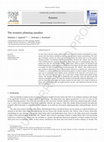
For more than a decade, futures studies scholars have prefaced scholarly contributions by repeati... more For more than a decade, futures studies scholars have prefaced scholarly contributions by repeating the claim that there is insufficient theory to support chaotic scenario methodology. The strategy is formulaic, and the net effect is a curious one, which the authors refer to as the scenario planning paradox. Contributing fresh theory supposedly attends to the " dismal " state of theory, while contributing new typologies purportedly helps bring order to methodological chaos. Repeated over time, the contribution strategy breaks down. Effort to resolve the theoretical and methodological issue, which motivates re-statement of the claim in the first place, ultimately fails. In actuality, the field is distanced from its purported goals. The " dismal " state of theory encourages scholars to adopt theory that is not necessarily tethered to a common core, which does not contribute to a shared, foundational theoretical perspective in futures studies. Perceived chaos gives way to typologies, which, as they mount, contribute to the chaos they were meant to resolve. The end result, intended by no one, is that theory remains dismal and methods remain chaotic. This direction for the field is indefensible and untenable; either the field accepts this claim as a statement of truth, for which the solution is substantially enhanced empiricism, or rejects the claim and re-interprets the bounty produced by said claim to be a kind of richness in theory and method rather than the implicit paucity, poverty, and imperfection that they oft signify to the field now.
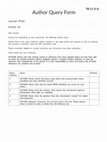
Futures & Foresight Science, 2020
This commentary is written as much for individuals already established in the field as it is for ... more This commentary is written as much for individuals already established in the field as it is for scholars beyond the relatively small world of futures studies. In addition to underscoring the programmatic agenda for research implied by Schoemaker’s (2020) new work and the curricular implications of the article for how students of futures and history are trained, our reply provides additional context regarding the scholarly conversations and scientific controversies that animate and bring meaning to research in futures studies and provides us with our collective sense of self as an academic community. At core, the notion that learning about the construction of history aids in constructing futures (e.g., through scenario planning), and, in parallel, that learning about the construction of futures aids in (re)constructing the past (e.g., through historical assessment), implicates a symbiotic analytical and academic practice world at the interface between history and futures studies that has yet to be realized through intensified intellectual traffic between these two mutually reinforcing enterprises.
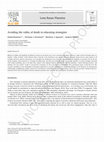
Long Range Planning, 2020
Billions of dollars and hundreds of millions of hours are invested every year in executive educat... more Billions of dollars and hundreds of millions of hours are invested every year in executive education. However, much of this investment dies in a familiar "Valley of Death" (VoD) wherein what is learned in the classroom is not applied when the strategist returns back to work. Based on 30 in-depth interviews and live observation, we investigate the architecture of an executive education program designed to avoid the VoD. In the observed program, senior partners of a strategy consulting firm, and their key strategist clients, are brought together to co-learn strategy associated with scenario planning, and, at the same time, improve their ongoing business relations. We find that adopting a "paired learning structure" and utilizing "live case content" results in "group-level co-learning" (or the co-production of knowledge) that, participants report, avoids the VoD. This research contributes to the scholarship on learning architecture in executive education by establishing linkages to the literature on client-partner relationships, modelling the student, and service co-production in knowledge-intensive organizations, and, in the end, provides a blueprint that professional service firms and business schools, seeking to produce more value for their participants, can jointly emulate.
Futures & Foresight Science, 2019
In this essay, which is a reply to Chermack's (2019) response to our article, the authors develop... more In this essay, which is a reply to Chermack's (2019) response to our article, the authors develop the most constructive feedback in the aforementioned response essay and then respond to more critical comments. As we shall see, in parallel with science and technology studies (STS) literature on the public understanding of science, the authors propose the utility of research on the “public understanding of futures and foresight science;” after that, the authors defend and add context to some of the decisions that had to be made in establishing the scope and framework for the article “Defining scenario” (Spaniol & Rowland, 2019).

Uploads
Papers by Matthew J . Spaniol
competitive advantage. Fulfilling these criteria warrants an accusation of greenwashing. With the aim to prevent its further spread and misuse, the article provides a diagnostic tool for separating similar but often conflated concepts from greenwashing to organize scholarly research, provide guidelines for practitioners, and support regulators’ case analysis.
for sustainable blue economies, issued a foresight report on cybersecurity
for executives and policymakers. This column summarizes
the emerging attacker enablers, defender trends, and recommendations
for companies, policymakers, and industry. The column can be used by
executives and policymakers as a starting point for a discussion with
cybersecurity professionals to determine the status of protections.
on scenarios, a specific tool named “Chat Generative Pre-trained Transformer” (hereafter, ChatGPT). The authors examine the utility of scenarios generated by artificial intelligence (AI) and explore whether or not the futures and foresight prac-academic community should selectively embrace advances in AI to assist in the generation of scenarios. In particular, the authors will consider (1) the utility of using scenarios generated completely by AI, (2) whether what is produced, in fact, constitute scenarios, based on conventional definitions, and (3) assess the utility of using AI to assist in the production of scenarios. At this point in time, artificially intelligent tools can now generate numerous scenarios on seemingly any topic at essentially zero cost to the user. Still, the authors insist that the utility of those scenarios is largely predicated on the user’s ability to coax the appropriate “raw material” from the artificially intelligent bot, which implicates, the authors contend, that such bots can usefully provide base material for the development of scenarios but are unlikely to fully eclipse scenarists in the production of scenarios. Additionally, the authors recommend that the futures and foresight prac-academic community pay especially close attention to artificially intelligent tools for novel insights with regard to the differences in human cognition and, in this case, the logic of large language model outputs.
Scholars claim that futures and foresight science should overcome “confusion” regarding the definition of core concepts, for example, the scenario. Admittedly, defining
scenario has been a challenge. Current practice, which results in repeated attempts to clarify said confusion with yet another new definition of scenario, has apparently not advanced the field. An alternative option is not to redefine scenario, but to, instead, create a shared definition composed of component parts of pre‐existing definitions. The result is an operant or synthesized definition based on analysis of claims indicating what “a scenario is…” and “scenarios are…” in the literature on scenario planning. The authors find that scenarios have a temporal property rooted in the future and reference external forces in that context; scenarios should be possible and plausible while taking the proper form of a story or narrative description; and that scenarios exist in sets that are systematically prepared to coexist as meaningful alternatives to one another. Despite claims to the contrary, the authors find that the academic community of futures and foresight science does not seem to suffer from so‐called confusion over the definition of scenario, and thus, it is time to sunset the use of claims to this end.
based on post-actor-network theory (ANT) literature, positions philosophical questions about the
ontological character of the future within the context of “planning” for it (i.e. in practice). Multiplicity, as
a post-ANT sensibility, helps one make sense of the empirical materials. This paper examines the
possibility that rather than being alternatives to one another, plural futures and the singular future might
co-exist in practice, and, thus, constitute a multiplicity.
Design/methodology/approach – In this case study, “planning” is narrative scenario planning. The
second author facilitates dialogue-based long-term strategic scenario planning processes, primarily in
Scandinavia and Northern Europe, and contributes a wealth of professional experience to the project.
The first author, an academic, shadows the second author. This paper examines experiential and
observational data for evidence of the ontological character of the future. Elements of a typical scenario
planning process, in this case, about the possibility of crewless (i.e. unmanned) shipping vessels are
demonstrated – although, insight into the crewless ship is submerged by our analytical attentiveness to
the ontology of the future.
Findings – The findings bear on what sort of “object” the future is. Practices associated with planning
for the future appear to transform it so that one future becomes many, and, without irony, managing the
growing number of futures seems to be a core function of planning for the future. The implication is that
neither plural futures nor the singular future is – individually – satisfactory to capture what is found in
practice. It is both plural and singular; ontologically, it is the future multiple.
Originality/value – The original contribution is in demonstrating how plural futures and the singular
future co-exist in practice. Thus, an eclipse of the future by futures can only ever be partial. For “futures”
to be conceptually potent, “the future” must be at least provisionally believable and occasionally useful.
Otherwise, if “the future” were so preposterous an idea, then “futures” would cease to be a critical
alternative to it. Futures needs the future; they are relationally bound together in a multiplicity. This paper
considers what such a logical reality implies for a field that distances itself from the future and
self-identifies with futures.
Keywords Ontology, Scenario planning, Actor-network theory, Maritime industry, Multiplicity,
Science and technology studies
Thesis Chapters by Matthew J . Spaniol
production of futures in facilitated scenario planning workshops and the certified knowledge produced about futures and scenarios in academic accounts and claims. Taking seriously the observation that scenario planning is the “laboratory” where futures are discovered and
experimented upon, this dissertation leverages the insights developed in the so-called “Laboratory Studies” in STS to unravel the inner workings of the practices of scenario planning (Latour & Wollgar, 1979). The findings support the notions that the relations between science,
laboratories, and scenarios are not trivial: The scientists and scenarists, with their instruments, methods, colleagues, and laboratories, carefully inscribe, negotiate, edit, and enact futures.
Talks by Matthew J . Spaniol
Research Articles by Matthew J . Spaniol
economies offer an opportunity as the electrification of the seas has captured the imagination of industry and policymakers as a pathway to achieving sustainable growth. Using the methods of morphological
analysis, thematic analysis, and structural analysis, this article identifies and reports on six innovation concepts for the electrification of the seas: Charging at wind farms; Charging at fish farms; Charging at thermal-powered platforms; Charging by floating solar panels; Charging at tidal plants; Charging at offshore container terminals. This article provides a base for entrepreneurship by generating insight into the affecting variables for each configuration as well as the identification of the strategic variables. It furthermore contributes a novel methodological approach to produce said understanding. The paper concludes with prospects for the electrification of the seas and charts a pathway for sustainable transition of the ocean economies.
competitive advantage. Fulfilling these criteria warrants an accusation of greenwashing. With the aim to prevent its further spread and misuse, the article provides a diagnostic tool for separating similar but often conflated concepts from greenwashing to organize scholarly research, provide guidelines for practitioners, and support regulators’ case analysis.
for sustainable blue economies, issued a foresight report on cybersecurity
for executives and policymakers. This column summarizes
the emerging attacker enablers, defender trends, and recommendations
for companies, policymakers, and industry. The column can be used by
executives and policymakers as a starting point for a discussion with
cybersecurity professionals to determine the status of protections.
on scenarios, a specific tool named “Chat Generative Pre-trained Transformer” (hereafter, ChatGPT). The authors examine the utility of scenarios generated by artificial intelligence (AI) and explore whether or not the futures and foresight prac-academic community should selectively embrace advances in AI to assist in the generation of scenarios. In particular, the authors will consider (1) the utility of using scenarios generated completely by AI, (2) whether what is produced, in fact, constitute scenarios, based on conventional definitions, and (3) assess the utility of using AI to assist in the production of scenarios. At this point in time, artificially intelligent tools can now generate numerous scenarios on seemingly any topic at essentially zero cost to the user. Still, the authors insist that the utility of those scenarios is largely predicated on the user’s ability to coax the appropriate “raw material” from the artificially intelligent bot, which implicates, the authors contend, that such bots can usefully provide base material for the development of scenarios but are unlikely to fully eclipse scenarists in the production of scenarios. Additionally, the authors recommend that the futures and foresight prac-academic community pay especially close attention to artificially intelligent tools for novel insights with regard to the differences in human cognition and, in this case, the logic of large language model outputs.
Scholars claim that futures and foresight science should overcome “confusion” regarding the definition of core concepts, for example, the scenario. Admittedly, defining
scenario has been a challenge. Current practice, which results in repeated attempts to clarify said confusion with yet another new definition of scenario, has apparently not advanced the field. An alternative option is not to redefine scenario, but to, instead, create a shared definition composed of component parts of pre‐existing definitions. The result is an operant or synthesized definition based on analysis of claims indicating what “a scenario is…” and “scenarios are…” in the literature on scenario planning. The authors find that scenarios have a temporal property rooted in the future and reference external forces in that context; scenarios should be possible and plausible while taking the proper form of a story or narrative description; and that scenarios exist in sets that are systematically prepared to coexist as meaningful alternatives to one another. Despite claims to the contrary, the authors find that the academic community of futures and foresight science does not seem to suffer from so‐called confusion over the definition of scenario, and thus, it is time to sunset the use of claims to this end.
based on post-actor-network theory (ANT) literature, positions philosophical questions about the
ontological character of the future within the context of “planning” for it (i.e. in practice). Multiplicity, as
a post-ANT sensibility, helps one make sense of the empirical materials. This paper examines the
possibility that rather than being alternatives to one another, plural futures and the singular future might
co-exist in practice, and, thus, constitute a multiplicity.
Design/methodology/approach – In this case study, “planning” is narrative scenario planning. The
second author facilitates dialogue-based long-term strategic scenario planning processes, primarily in
Scandinavia and Northern Europe, and contributes a wealth of professional experience to the project.
The first author, an academic, shadows the second author. This paper examines experiential and
observational data for evidence of the ontological character of the future. Elements of a typical scenario
planning process, in this case, about the possibility of crewless (i.e. unmanned) shipping vessels are
demonstrated – although, insight into the crewless ship is submerged by our analytical attentiveness to
the ontology of the future.
Findings – The findings bear on what sort of “object” the future is. Practices associated with planning
for the future appear to transform it so that one future becomes many, and, without irony, managing the
growing number of futures seems to be a core function of planning for the future. The implication is that
neither plural futures nor the singular future is – individually – satisfactory to capture what is found in
practice. It is both plural and singular; ontologically, it is the future multiple.
Originality/value – The original contribution is in demonstrating how plural futures and the singular
future co-exist in practice. Thus, an eclipse of the future by futures can only ever be partial. For “futures”
to be conceptually potent, “the future” must be at least provisionally believable and occasionally useful.
Otherwise, if “the future” were so preposterous an idea, then “futures” would cease to be a critical
alternative to it. Futures needs the future; they are relationally bound together in a multiplicity. This paper
considers what such a logical reality implies for a field that distances itself from the future and
self-identifies with futures.
Keywords Ontology, Scenario planning, Actor-network theory, Maritime industry, Multiplicity,
Science and technology studies
production of futures in facilitated scenario planning workshops and the certified knowledge produced about futures and scenarios in academic accounts and claims. Taking seriously the observation that scenario planning is the “laboratory” where futures are discovered and
experimented upon, this dissertation leverages the insights developed in the so-called “Laboratory Studies” in STS to unravel the inner workings of the practices of scenario planning (Latour & Wollgar, 1979). The findings support the notions that the relations between science,
laboratories, and scenarios are not trivial: The scientists and scenarists, with their instruments, methods, colleagues, and laboratories, carefully inscribe, negotiate, edit, and enact futures.
economies offer an opportunity as the electrification of the seas has captured the imagination of industry and policymakers as a pathway to achieving sustainable growth. Using the methods of morphological
analysis, thematic analysis, and structural analysis, this article identifies and reports on six innovation concepts for the electrification of the seas: Charging at wind farms; Charging at fish farms; Charging at thermal-powered platforms; Charging by floating solar panels; Charging at tidal plants; Charging at offshore container terminals. This article provides a base for entrepreneurship by generating insight into the affecting variables for each configuration as well as the identification of the strategic variables. It furthermore contributes a novel methodological approach to produce said understanding. The paper concludes with prospects for the electrification of the seas and charts a pathway for sustainable transition of the ocean economies.